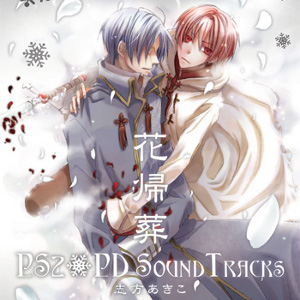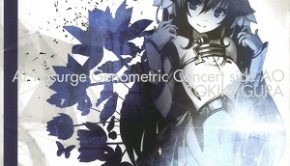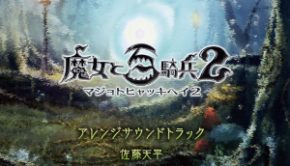Hanakisou & Hanakisou Plus Disc Soundtracks
 |
Album Title: Hanakisou & Hanakisou Plus Disc Soundtracks |
| Record Label: Vagrancy |
|
| Catalog No.: AURA008/11 |
|
| Release Date: August 13, 2006 |
|
| Purchase: Buy at Official Site |
Overview
A doujin yaoi title released initially for the PC by Haccaworks in 2003, Hanakisou isn’t the type of game I would choose to play. However, the title is notable for being one of the few games for which Akiko Shikata composed, and the only game which she originally served as sole composer. The title went on to receive two ports, first for the PlayStation 2 in 2006 and later for the PSP in 2010. The latter two featured more events and thus more music than its predecessor does, and it is this collection that supersedes the original soundtrack release with an additional two discs. The additional music for these versions was provided mostly by Tomoko Imoto, who some might recognize as co-composer for the second and third Shadow Hearts titles. In this four disc soundtrack, the music from the original and port versions of the game are combined. This release creates the fascinating scenario of Shikata-composed music that, to a large degree, does not contain any of her trademark vocals or music box, and in turn provides insight into her instrumental skills. How does her music sound without her own voice singing in the background? Can Imoto’s additions flesh out and balance the original soundtrack?
Body
Right out of the gate, we are treated to “Flower Funeral,” the game’s theme and main vocal, whose poignant melody should surprise no one familiar with Shikata’s work from Ar Tonelico and likewise. While it doesn’t necessarily stand out, it’s as fresh and enjoyable as anything else the composer has worked on. The main theme arrangement “Flower Funeral ~To You, My Precious One~” features quite a moving violin melody and might be superior to the original. The experience continues with the gentle, soothing title track, “Something White that Continues to Fall.” Here is the listener’s first hint at the thick drama that pervades this album. Even predominately light tracks, such as “The Town’s Breath,” feature a strong melodic element that is hard not to find moving.
More than that though, it’s the character themes are what are filled with depth and emotion. “Kuroto” starts with a simple synth motif that slowly builds quite masterfully into a moving statement. The flute’s dramatic melody, layered above a violin and an electric guitar, sounds quite gorgeous. The sublime “Shirofukurou” with its soft, almost Asian beat and sound, is hardly overbearing and is quite impressive. The militaristic “Ginshu,” meanwhile, is of an entirely different sort. The cymbal hits seemed toned down a bit, so as not to overload the melody, and this lends a muted sound to the piece that works in its favor. The lighter “Kisa” is more akin to what one would find in a visual novel, with its light glockenspiel-sounding synth and accordion. Lastly, the ticking which introduces “Kurotaka” belies a heavy, grungy theme, lavish with its electric guitar usage. A piano is introduced to offset the heavy nature, and the balance struck is remarkable.
Moving beyond the character themes, “Twilight” is achingly beautiful, one of the several instrumental pieces that achieves this. The solo music box piece (being a Shikata album there of course has to be at least one) “Cradle” sounds likewise. For one’s next fix, one need proceed to the album’s second disc, which features the second half of the bulk of Shikata’s themes. “The Tear,” for piano and strings (and a flute, later on), arranged by Imoto, is absolutely profound and moving, as is the following track and second music box theme, “Nostalgia,” which outperforms the first, melodically. “Memory,” unfortunately, ends just as soon as its promising buildup begins to reach a satisfying climax, unlike “Outside of the Miniature Garden” which builds and climaxes astoundingly.
There are, of course, quite a few vocal pieces composed and performed by Shikata found amongst these first two discs. “Snowfall ~Origin~” is rather simple, not doing much melodically, instead opting to set a dark mood. Much better is the quite dark “Lamb of God” that sounds almost Baroque in its presentation, though it is only mimicking an approximation of the style. The far lighter “Smile” is also more moving, despite its relative simplicity.
The third disc is predominately original music by Tomoko Imoto, and unfortunately her contributions aren’t quite as thrilling. Of the welcome exceptions are the silly and cute “A Welcome Request” and the similarly whimsical yet peaceful “Flourishing.” A further highlight is the original version of “Ephemeral ~The Place pursued by Feelings”, which features solo piano. It is perhaps superior to Shikata’s vocal arrangement, “Ephemeral ~The Snow that Disappears in the Palm of My Hands~,” a piece that starts nice and gentle, and builds in intensity somewhat before it loops. The rest of the disc is comprised mostly of either simple themes or atmospheric, mood-setting tracks.
After opening with a few original tracks by Imoto, none of which stand out in particular, but all of which are nonetheless satisfying to listen to, the remainder of the fourth disc is comprised mainly of character themes composed by Shikata but arranged by Imoto. These are all really quite good. Imoto offers enjoyable arrangements that supplement and show a whole new side to what were already exceptional pieces. While they are rarely more complex than just mixing the track up a bit, the arranger shows some welcome skill nonetheless in this pursuit. One of her last original tracks, “Black and Black,” is also quite enjoyable to hear, comprised of soothing, moving flute melodies.
Summary
This soundtrack is quite fantastic. Shikata’s work in particular is her only instrumental, non-music box compositions, and these show, dare I say, more of a maturity than her vocal works. Any fan of Shikata should pick up this album, if only to see a different side to her. A newcomer would probably find her solo albums to be more fulfilling, however. While these pieces may possess a kind of maturity, there still is no real comparison to a Shikata vocal. Imoto, while the relative weak link in this album, still contributes some worthwhile compositions, notably her arrangements of Shikata’s, but also some original ones of her own. This is certainly a unique album for visual novels, and one that shouldn’t be missed by anyone curious.
Do you agree with the review and score? Let us know in the comments below!
4.5
Posted on April 10, 2014 by Marc Friedman. Last modified on April 8, 2014.














